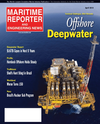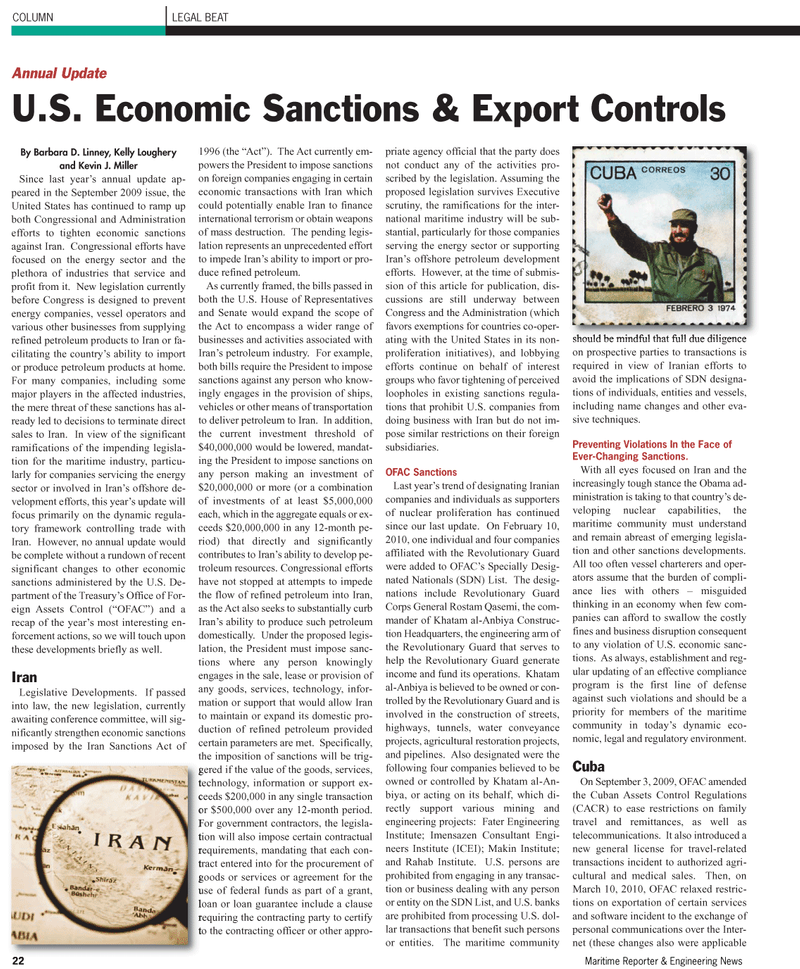
Page 22: of Maritime Reporter Magazine (April 2, 2010)
Read this page in Pdf, Flash or Html5 edition of April 2, 2010 Maritime Reporter Magazine
COLUMN LEGAL BEAT
By Barbara D. Linney, Kelly Loughery and Kevin J. Miller
Since last year’s annual update ap- peared in the September 2009 issue, the
United States has continued to ramp up both Congressional and Administration efforts to tighten economic sanctions against Iran. Congressional efforts have focused on the energy sector and the plethora of industries that service and profit from it. New legislation currently before Congress is designed to prevent energy companies, vessel operators and various other businesses from supplying refined petroleum products to Iran or fa- cilitating the country’s ability to import or produce petroleum products at home.
For many companies, including some major players in the affected industries, the mere threat of these sanctions has al- ready led to decisions to terminate direct sales to Iran. In view of the significant ramifications of the impending legisla- tion for the maritime industry, particu- larly for companies servicing the energy sector or involved in Iran’s offshore de- velopment efforts, this year’s update will focus primarily on the dynamic regula- tory framework controlling trade with
Iran. However, no annual update would be complete without a rundown of recent significant changes to other economic sanctions administered by the U.S. De- partment of the Treasury’s Office of For- eign Assets Control (“OFAC”) and a recap of the year’s most interesting en- forcement actions, so we will touch upon these developments briefly as well.
Iran
Legislative Developments. If passed into law, the new legislation, currently awaiting conference committee, will sig- nificantly strengthen economic sanctions imposed by the Iran Sanctions Act of 1996 (the “Act”). The Act currently em- powers the President to impose sanctions on foreign companies engaging in certain economic transactions with Iran which could potentially enable Iran to finance international terrorism or obtain weapons of mass destruction. The pending legis- lation represents an unprecedented effort to impede Iran’s ability to import or pro- duce refined petroleum.
As currently framed, the bills passed in both the U.S. House of Representatives and Senate would expand the scope of the Act to encompass a wider range of businesses and activities associated with
Iran’s petroleum industry. For example, both bills require the President to impose sanctions against any person who know- ingly engages in the provision of ships, vehicles or other means of transportation to deliver petroleum to Iran. In addition, the current investment threshold of $40,000,000 would be lowered, mandat- ing the President to impose sanctions on any person making an investment of $20,000,000 or more (or a combination of investments of at least $5,000,000 each, which in the aggregate equals or ex- ceeds $20,000,000 in any 12-month pe- riod) that directly and significantly contributes to Iran’s ability to develop pe- troleum resources. Congressional efforts have not stopped at attempts to impede the flow of refined petroleum into Iran, as the Act also seeks to substantially curb
Iran’s ability to produce such petroleum domestically. Under the proposed legis- lation, the President must impose sanc- tions where any person knowingly engages in the sale, lease or provision of any goods, services, technology, infor- mation or support that would allow Iran to maintain or expand its domestic pro- duction of refined petroleum provided certain parameters are met. Specifically, the imposition of sanctions will be trig- gered if the value of the goods, services, technology, information or support ex- ceeds $200,000 in any single transaction or $500,000 over any 12-month period.
For government contractors, the legisla- tion will also impose certain contractual requirements, mandating that each con- tract entered into for the procurement of goods or services or agreement for the use of federal funds as part of a grant, loan or loan guarantee include a clause requiring the contracting party to certify to the contracting officer or other appro- priate agency official that the party does not conduct any of the activities pro- scribed by the legislation. Assuming the proposed legislation survives Executive scrutiny, the ramifications for the inter- national maritime industry will be sub- stantial, particularly for those companies serving the energy sector or supporting
Iran’s offshore petroleum development efforts. However, at the time of submis- sion of this article for publication, dis- cussions are still underway between
Congress and the Administration (which favors exemptions for countries co-oper- ating with the United States in its non- proliferation initiatives), and lobbying efforts continue on behalf of interest groups who favor tightening of perceived loopholes in existing sanctions regula- tions that prohibit U.S. companies from doing business with Iran but do not im- pose similar restrictions on their foreign subsidiaries.
OFAC Sanctions
Last year’s trend of designating Iranian companies and individuals as supporters of nuclear proliferation has continued since our last update. On February 10, 2010, one individual and four companies affiliated with the Revolutionary Guard were added to OFAC’s Specially Desig- nated Nationals (SDN) List. The desig- nations include Revolutionary Guard
Corps General Rostam Qasemi, the com- mander of Khatam al-Anbiya Construc- tion Headquarters, the engineering arm of the Revolutionary Guard that serves to help the Revolutionary Guard generate income and fund its operations. Khatam al-Anbiya is believed to be owned or con- trolled by the Revolutionary Guard and is involved in the construction of streets, highways, tunnels, water conveyance projects, agricultural restoration projects, and pipelines. Also designated were the following four companies believed to be owned or controlled by Khatam al-An- biya, or acting on its behalf, which di- rectly support various mining and engineering projects: Fater Engineering
Institute; Imensazen Consultant Engi- neers Institute (ICEI); Makin Institute; and Rahab Institute. U.S. persons are prohibited from engaging in any transac- tion or business dealing with any person or entity on the SDN List, and U.S. banks are prohibited from processing U.S. dol- lar transactions that benefit such persons or entities. The maritime community should be mindful that full due diligence on prospective parties to transactions is required in view of Iranian efforts to avoid the implications of SDN designa- tions of individuals, entities and vessels, including name changes and other eva- sive techniques.
Preventing Violations In the Face of
Ever-Changing Sanctions.
With all eyes focused on Iran and the increasingly tough stance the Obama ad- ministration is taking to that country’s de- veloping nuclear capabilities, the maritime community must understand and remain abreast of emerging legisla- tion and other sanctions developments.
All too often vessel charterers and oper- ators assume that the burden of compli- ance lies with others – misguided thinking in an economy when few com- panies can afford to swallow the costly fines and business disruption consequent to any violation of U.S. economic sanc- tions. As always, establishment and reg- ular updating of an effective compliance program is the first line of defense against such violations and should be a priority for members of the maritime community in today’s dynamic eco- nomic, legal and regulatory environment.
Cuba
On September 3, 2009, OFAC amended the Cuban Assets Control Regulations (CACR) to ease restrictions on family travel and remittances, as well as telecommunications. It also introduced a new general license for travel-related transactions incident to authorized agri- cultural and medical sales. Then, on
March 10, 2010, OFAC relaxed restric- tions on exportation of certain services and software incident to the exchange of personal communications over the Inter- net (these changes also were applicable
Annual Update
U.S. Economic Sanctions & Export Controls 22 Maritime Reporter & Engineering News

 21
21

 23
23
